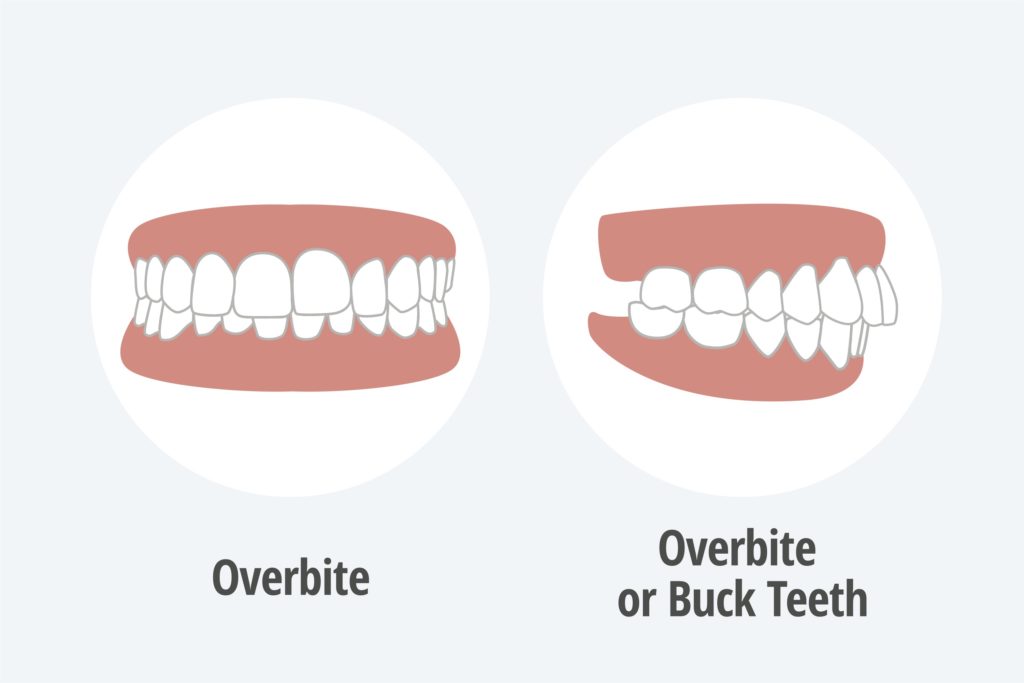
In his over 20 years as an orthodontist, Dr. Patel has seen his fair share of excessive overbite teeth. After all, excessive overbite, also called a “deep bite,” is one of the most common kinds of malocclusion, or misalignment of teeth. Thankfully, Dr. Patel and the team at The Brace Place can fix an overbite so you get the functional, confident smile you deserve.
If you’re concerned about an overbite in your child, we suggest bringing them in to see us for an initial visit by age seven. The American Association of Orthodontist (AAO) suggests this is a great time for a first orthodontic appointment… and we agree! Why? Because by age seven, a child has some of their adult teeth already and their jaw shape is pretty much set. A skilled orthodontist like Dr. Patel can spot potential issues — like an excessive overbite — that might need treatment.
What is An Overbite?
Before we answer the question in the title of this post, “Do you need braces if you have an overbite?” let’s cover the basics. “What is an overbite? What does an overbite look like? Do I have an overbite?” you might be wondering. Well, an overbite is when your top row of teeth vertically overlaps your bottom teeth when your back teeth are closed. You could also think of it as your top row of teeth sticking out farther than your bottom teeth.
Now, we should mention that not all overbites are considered issues that need fixing. In fact, it’s normal to have a slight overbite. But when the amount of overbite is too large, it’s problematic and you might need orthodontic correction.
What is considered an excessively large overbite? Of course, the best way to know for sure is to have an experienced orthodontic specialist like Dr. Patel take a look. But a few at-home indicators that you have an excessive overbite are:
If your bottom teeth bite into the roof your mouth – Called a deep bite or impinging bite, your top teeth might overlap your bottom ones entirely, causing your bottom teeth to hit the roof of your mouth when your jaw is closed.
You have the appearance of a receding chin or undefine lower jaw – An excessive overbite can affect your facial appearance, especially if your excessive overbite is because of your jaw or skeletal structure, like a small lower jaw.
Your teeth look like they’re not straight or aligned – When individual teeth (versus the entire jaw) aren’t in their proper position, what can result is a dental overbite. Shifting those misaligned teeth can correct your overbite, as well as other issues like crowding, gapping, or twisted teeth.
Overbite vs. Overjet
Understandably, an excessive overbite can be confused with overjet. After all, the overall look of these two issues is similar at first glance. And many patients with an overbite also have overjet teeth.
However, an overbite is the vertical overlap of your top teeth sitting outside your bottom teeth. While overjet is the horizontal distance between upper front teeth and lower teeth — how much only the top front teeth flare out from the teeth below them. That’s why overjet is also called “buck teeth.”
What Causes Overbite Teeth?
There are several causes of overbite teeth. These include:
Genetics: The most common cause of overbite is genetics. The size and shape of your jaw is usually inherited and can sometimes cause problems with the growth or development of your jaw or teeth. In this case, an overbite can happen because the lower jaw is too small.
Misaligned Teeth: As we mentioned earlier, you can have a dental overbite when the issue stems from misaligned teeth instead of your jaw. An overbite can happen when teeth aren’t aligned or they’re crowding because your jaw is too small. Sometimes these teeth issues happen from growth issues like an early loss of baby teeth.
Missing Lower Teeth: When back lower teeth are missing because of injury or decay, this can cause the same problems as having a small lower jaw.
Grinding or Clenching Your Teeth: Bruxism, the technical name for a persistent habit of grinding or clenching teeth, can result in really strong biting muscles. This might sound harmless but can cause your bite to deepen.
Aging: It’s natural for a bite to deepen as you age. This can mean that even a mild overbite that hasn’t bothered you for years can worsen and begin to cause functional or aesthetic problems. And if you had orthodontic treatment in the past but didn’t wear your retainer, sometimes the excessive overbite you used to have can reappear when you’re older.
What Happens if You Don’t Get Overbite Correction?
It’s pretty clear that if you have an excessive overbite and don’t fix it, you could run into some oral complications. And it’s not only the way your smile and overall facial appearance look but the functionality of your teeth, too. Your teeth, jaws, and temporomandibular joints (TMJ) can all be impacted.
Increased Risk of Tooth Decay and Gum Disease
An excessive overbite canincrase your risk of tooth decay, cavities, and gum disease. On the flip side, one of the greatest long-term benefits of a normal bite and straight teeth is that maintaining good oral health is much easier. Brushing and flossing are more effective, lessening your risk of tooth decay and gum disease.
We should also mention that if your overbite causes your lower teeth to touch the gums behind the front teeth when you close your mouth, you can get gum recession, which can weaken teeth.
Excessive Wear on Your Tooth Enamel
Over time, an overbite can contribute to excessive wear on your tooth enamel, the thin yet protective coating on your teeth that helps protect against cavities. You might also experience uneven wear because of how your upper and lower teeth come together when you bite or chew. Uneven wear on your tooth enamel not only puts you at more risk of cavities but can change the appearance of your teeth
Breathing Issues from an Overbite
It might surprise you to learn that in some cases of severe overbite, your airway can be restricted, contributing to obstructive sleep apnea. And people with skeletal overbites are more likely to snore and mouth breath when they sleep.
Impaired Chewing and Bite Functioning
Even a moderate excessive overbite can impact how well you chew your food. For a start, think about foods like pizza, sandwiches, or apples that you bite and tear into with your front teeth. Top and bottom teeth that aren’t stacked on top of each other well make it harder to bite into certain foods.
Speaking and Pronunciation Problems
Malloclusions of any kind can cause speech problems like lisping. Overbites in particular can interfere with pronouncing “s,” “z,” “sh,” and “zh,” or “d, “l,” and “t” correctly.
Jaw Pain and TMJ Disorder
Overbite teeth that aren’t corrected can also cause considerable facial pain or discomfort. A bite that isn’t aligned can put extra stress on the TMJ and chewing muscles that connect the lower jaw to the upper jaw on either side of your face. We’ve had many patients come to The Brace Place concerned about jaw pain, headaches, and even earaches, which come from misaligned bites or severe overbites.
Decrease in Self-Esteem
Adding to the functional issues mentioned above, having an overbite can affect your smile and how your face looks. For many of our patients, facial disharmony can negatively affect their confidence. We’ve found that treating an overbite for cosmetic reasons is often just as rewarding for our patients as the functional benefits.
How To Fix an Overbite
All that said, let’s turn to how to fix an overbite and circle back to the question: Do you need braces to fix an overbite? It’s different for every patient, since the kind of overbite and severity are unique for every person. We also consider our patient’s age — kids with a deep bite can benefit from Phase 1 early interceptive orthodontics and Phase 2 orthodontics later on in their teen years. Adult patients can dive right into typical orthodontic treatment.
When you come to visit us at our Tulsa or Claremore, OK orthodontist office, Dr. Patel will provide a thorough examination and an accurate diagnosis of your malocclusion. He’ll also explain your best, personalized options for getting a smile you’ll love and that works for your lifestyle.
So, do braces or Invisalign® fix an overbite? We can confidently say, yes, braces provide great results for an overbite! We might add orthodontic rubber bands, which provide the leverage needed to bring the upper and lower arches together, aligning your overbite. At The Brace Place, we offer modern metal braces and ceramic braces that will efficiently transform your smile.
If you’re not keen on braces but are interested in Invisalign, you’ll be pleased to know that these clear aligners can fix an overbite in Dr. Patel’s experienced hands.
In rare cases where braces or Invisalign aren’t a match for the severity of your overbite, we might suggest overbite surgery. Or we might conclude that fixing your overbite requires a combination of braces or Invisalign and surgery.
Whatever your specific overbite needs, we’re tech-savvy at The Brace Place, using the latest orthodontic technology to address our patients’ needs successfully. We also want our patients to experience efficient and comfortable treatment.
Overbite Correction With The Brace Place
Now that you’ve learned all about overbites and can answer, “What is an overbite?” Dr. Patel is ready to help. At The Brace Place, we can address your overbite and help you achieve a beautiful smile you’re proud of.
Contact us today and get started on a new smile with your friendly, expert orthodontic team in Tulsa and Claremore, OK.



























